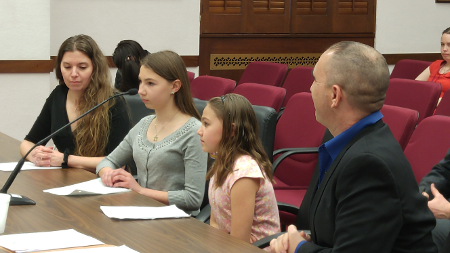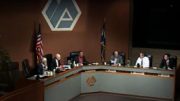By Jeffrey A. Roberts
CFOIC Executive Director
A Jefferson County charter school board violated Colorado’s Open Meetings Law by failing to sufficiently announce the topics of two closed-door meetings in 2015, a judge has ruled.
To convene a valid executive session under the Open Meetings Law, aka the Sunshine Law, a local public body must publicly identify “the particular matter to be discussed in as much detail as possible without compromising the purpose for which the executive session is authorized.”
The board of Montessori Peaks Academy fell short of that requirement on two occasions by merely citing a subsection of the statute and quoting from it, Jeffco District Court Judge Jeffrey Pilkington determined in a Dec. 21 order. The judge reaffirmed his ruling this week when he rejected the school’s motion for relief from judgment.

The McDaniel family testified before a state legislative committee in 2016 on a school board ethics bill (photo courtesy of The Colorado Independent).
The topic of one of the executive sessions, held in February 2015, simply was listed as “investigation,” along with a statutory citation.
“The board did not include the particular matter to be discussed and did not strictly comply with the requirements for convening an executive session,” Pilkington wrote. The school board, he noted, “attempts to excuse its obligations by arguing that this session concerned … misconduct by a teacher and the board feared that the identity of the teacher would become public.”
But the board could have used “any number of descriptions,” the judge determined, “and would not have compromised the purpose for which the executive session was authorized.”
The judge’s findings stem from a lawsuit filed last April by Alex and Joanne McDaniel, who were dissatisfied with the way Montessori Peaks Academy educated and treated their daughters. The legal action alleged that school officials took “retaliatory actions” against the family after they started asking questions about the school’s administration.
The McDaniels’ lawsuit also alleged that the board discussed matters not permitted in executive session and that it destroyed executive-session recordings in violation of the law. The judge ruled against them on these claims, finding that the closed-door meeting held to discuss an investigation into teacher misconduct was appropriate under the Sunshine Law. He also found that Montessori Peaks Academy had no obligation under the law to retain executive session recordings for more than 90 days.
Pilkington found that one other executive session had been described to the public in sufficient detail. He also refused to enter a declaratory judgment, requested by the McDaniels, that charter school boards must abide by the state law that sets rules for boards of education to follow, in addition to those imposed by the Open Meetings Law.
The school board statute requires, for instance, that votes be taken by roll call. It also says that meeting minutes must indicate the topic of executive sessions as well as “the amount of time each topic was discussed while the board was meeting in executive session.”
The McDaniels argued that because charter school boards act like boards of education, their meetings ought to be regulated by the same statute – a statute that requires more transparency. But the judge concluded that state law “clearly differentiates” between charter school boards and boards of education.
“In total, we are very pleased that the courts recognized that (the school board) conducted illegal closed-door meetings,” Joanne McDaniel wrote in an email to the Colorado Freedom of Information Coalition. “This is big step for shining the light on charter school governance.”
Follow the Colorado Freedom of Information Coalition on Twitter @CoFOIC. Like CFOIC’s Facebook page. Do you appreciate the information and resources provided by CFOIC? Please consider making a tax-deductible donation.




